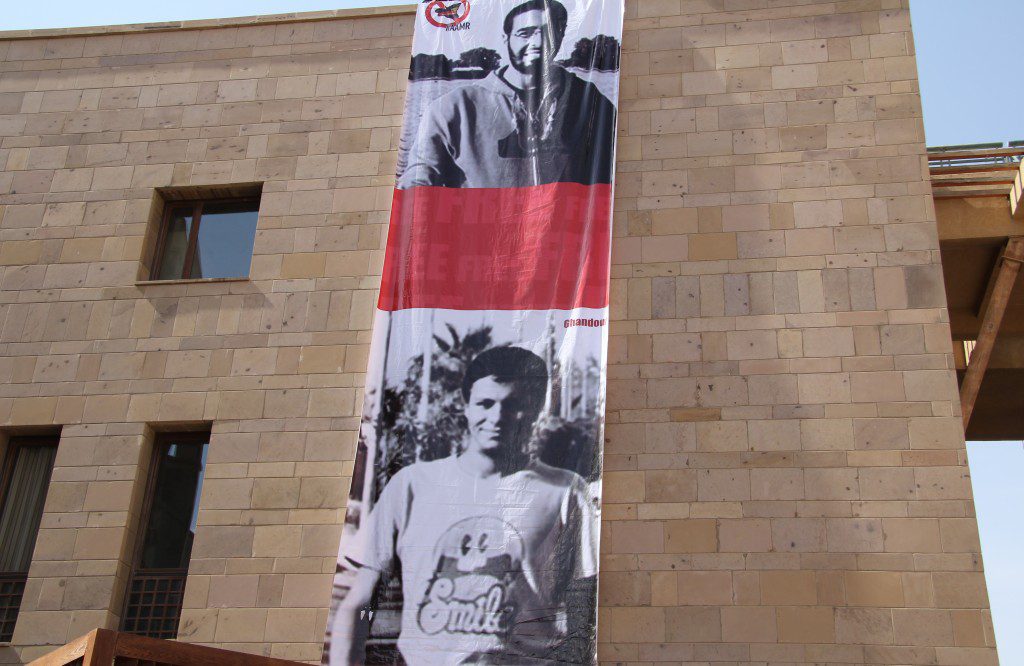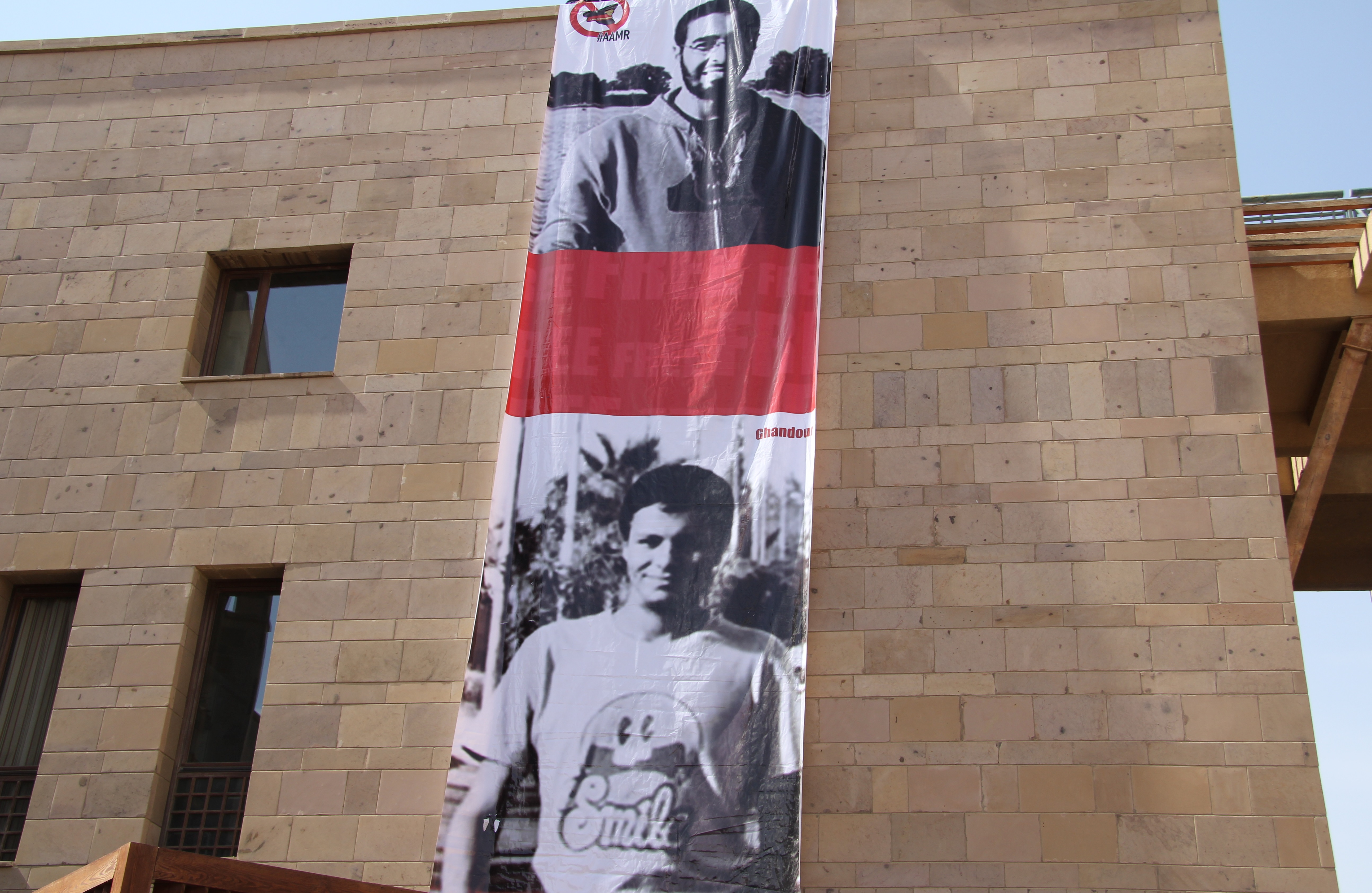BY AMIRA SHERIF

Photo: Amira Sherif
Dozens of students joined in an awareness campaign at Bartlett Plaza Sunday calling for the release of two AUCians who were detained by authorities after participating in a protest march late last year.
Former Student Union (SU) President Taher El Moataz Bellah and Aly El Boghdady, the brother of one of the detainees, said they organized the protest not only to raise awareness that two AUCians were in jail but also to support freedom of speech.
Mechanical Engineering student Abd El Rahman Boghdady and Abdallah Ghandour, a Computer Science junior, were arrested by police December 20 during a protest calling for an end to military rule and for the release of political detainees.
Their arrest came less than a month after the then-newly enacted protest law, which prohibited “unsanctioned gatherings” of 10 people or more.
A protest must first receive police approval before it can be held. Violators, the ban said, would be subject to police arrest and legal action.
The law was created under interim President Adly Mansour.
Boghdady and Ghandour’s court hearing has been twice postponed; they have been incarcerated in jail since their arrest.
AUC’s legal department said they could not comment on the case.
“The main aim of today was not to defend Boghdady and Ghandour only, but to raise awareness and put an end to the fear that we all have toward [Defence Minister Abdel-Fatah] El-Sissi,” said Al Moataz Bellah.
Mostafa Shams, a Petroleum Engineering senior, who is a friend of the detained AUCians, claimed that there are 2,000 students currently incarcerated by the government.
“This shows how corrupt the regime still is, and how hard it has become to state your own opinion about them,” he said.
While the Caravan could not independently verify the figure, a review of local media reports over the course of the past few months revealed that hundreds of students have been detained for allegedly participating in illegal protests.
Al Moataz Bellah and Boghdady said they want to break the barrier of silence and stress the people’s rights to freedom of speech.
During the protest, a banner depicting the detained students was rolled down from the roof of the School of Science
and Engineering near the SU Help Desk. In a bid to attract attention to their message, they attempted to set alight a poster of El-Sissi, but failed because the
material was not flammable. “We needed to shock the people
to deliver our message, and that’s what we’ve done,” said Hassaballah El Kafrawi, a Political Science senior.
When the poster failed to light, it was torn up and stomped on.
Mariam AbdelAziz, an Integrated Marketing Communication senior said, “People started to gather around when they tried to burn the picture of El-Sissi.”
But some of those who gathered to see what was happening told the Caravan that they felt offended by the campaign’s “antics”.
Amna Nasef, an undeclared sophomore, said the attempt to burn the El-Sissi poster was “absolutely an act of disrespect.”
“There is no right for anyone to use such methods in order to state a point or express a certain opinion,“ she said.
Others said they saw the campaign as an act of violence that needed to be stopped by the university.
“This was an absolute show that failed to succeed at even inspiring or impressing the students,” said Farah Bakhaty, an Accounting sophomore.
“I feel sorry for the two detained AUCians but I must say that the military has to be harsh to protect the country’s critical situation and security.”
“Abd El Fatah El-Sissi is the country’s best solution for the time being,” said Marketing senior Meray Aziz who had gathered around the student protesters.
One student who believed that it was unacceptable to burn a poster of a public figure like El-Sissi picked a fight with Al Moataz Bellah, but the scuffle was quickly resolved.
AUC security arrived on the scene after the scuffle, but did not interfere. Shams acknowledged that the campaign’s organizers realized that their actions would be risky, but that this was their “last worst-case scenario” move. “We all know that El-Sissi will win [if he runs for president in upcoming elections], but we wanted show the people that it is not wrong to be against
him and say no,” said Shams. El Kafrawi said that his main concern was the prospect of stifled free speech, not specifically El-Sissi’s expected
presidential bid. “We wanted to show the people that a[he] will still be criticized and protested against just like any other candidate, and that he will not win 99 percent of the votes. There are protesters against him and against the military rule,” said El Kafrawi.
Although there were a number of students who voiced their opposition to the way the campaign was carried out, an equal number thanked the organizers and provided words of encouragement.
“We found people who were actually not from our group and don’t belong to us supporting and standing next to us,” Al Moataz Bellah said.
“In protests you will always find a crowd running from tear gas or police,” he added.
“But there will always be the guy who stops and looks back to stop the people from running away in fear, and that’s what we were trying to do.”
